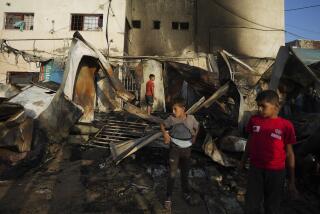Ex-Soviets to Get Surplus Gulf War Supplies : Relief: U.S. Air Force planes will airlift leftover food and medicine to all 12 of the new independent states.
- Share via
WASHINGTON — The U.S. government will airlift food and medicine left over from the Persian Gulf War to all 12 republics of the former Soviet Union, the Bush Administration announced Thursday at the conclusion of a 47-nation conference on aid to the dissolved empire.
The U.S. Air Force will deliver the aid in 54 cargo plane flights during a two-week period next month, Secretary of State James A. Baker III said at the conference, which focused worldwide attention on the human needs left in the rubble of the collapse of communism.
Baker also announced the appointment of Richard L. Armitage, a former Pentagon official and diplomatic trouble-shooter, to supervise the delivery of American assistance and to combat the rampant waste and theft that have frustrated some earlier aid attempts.
Baker said that Armitage, who was the chief American negotiator in talks with the Philippines on U.S. bases there, “will serve as the operational on-the-ground coordinator of emergency assistance . . . (to) reduce the danger of food and medical shipments being diverted.”
Although comparatively little new aid was pledged during the two-day conference, the participants produced “action plans” on food, medicine, fuel and shelter calling for careful coordination of programs to prevent overlap and ensure assistance goes to areas of greatest need.
A senior State Department official said that the conference’s most important achievement may have been that it forced participating nations to review their programs and “get their own act together.”
Also Thursday, more than 300 representatives of non-government relief organizations ended a parallel conference by drawing up plans to coordinate their efforts. Although the private meeting was sponsored by the White House, many delegates grumbled loudly that the U.S. government was doing too little to assist their efforts.
Baker said that next month’s airlift is planned for maximum symbolic impact. At least one flight will go to each of the 12 republics, with the possible exception of strife-torn Georgia, where security is a concern.
“Of course, no airlift could ever come close to meeting all the needs of the people of the new independent states,” Baker conceded. But he said the operation “can vividly show the peoples of the former Soviet Union that those that once prepared for war with them now have the courage and the conviction to use their militaries to say, ‘We will wage a new peace.’ ”
Manfred Woerner, secretary-general of the North Atlantic Treaty Organization, said that NATO is prepared to devote some of its extensive logistics capacity--designed to supply armies that might have fought the old Soviet Union and its allies--to speed aid to the republics. “Nothing could better symbolize the end of the Cold War,” Woerner said.
Officials said that the airlift will cost $3 million to $5 million, using part of a $100-million fund appropriated last year by Congress. The officials said that surplus food worth about $44 million and drugs worth about $17 million will be delivered by C-5A and C-140 aircraft.
During the conference, delegates discussed figures that ranged from $20 billion to $70 billion in aid either already provided or promised. But those numbers include German payments toward the cost of removing Soviet troops from the territory of the former East Germany.
Officials participating in a concluding press conference said that about $500 million in grants and $5 billion in loans is currently in the pipeline to the republics.
At the insistence of U.S. sponsors, the conference was limited to short-term humanitarian aid. Several European delegates said that the world community soon must face up to providing money to stabilize the imploding old Soviet economy, a sum estimated at $20 billion or more.
Almost all participants agreed that the most daunting problem in feeding, housing and otherwise caring for the people of the former Soviet Union is rampant corruption and inefficiency that has diverted aid to the black market or left it to rot.
Hans van den Broek, foreign minister of the Netherlands, said that the former Soviet Union is rich in coal, oil and other energy resources but that production has dropped precipitously. He said the energy industry is racked by “huge wastage.” For instance, Van den Broek said, oil fields in the republics burn off about 35 billion cubic meters of natural gas a year, equivalent to the annual consumption of the Netherlands.
A U.S. official said that Armitage’s job will be to find officials or charitable organizations in each republic that can be trusted to deliver supplies. “If you have a competent governmental authority on the ground, things go OK, but if not, the pallets have legs,” the official said.
More to Read
Sign up for Essential California
The most important California stories and recommendations in your inbox every morning.
You may occasionally receive promotional content from the Los Angeles Times.










